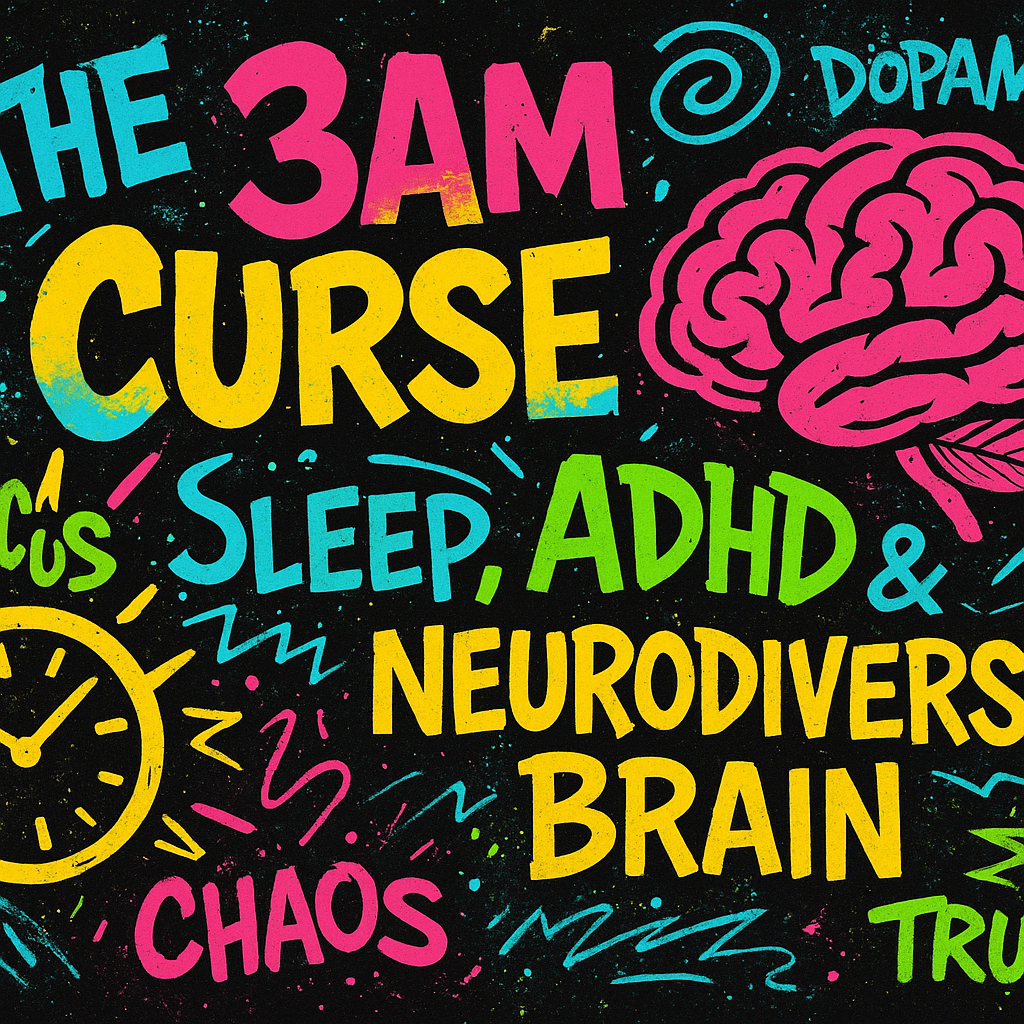
The 3am Curse: Sleep, Adhd & The Neurodiverse Brain
Share
Ever spent a night staring at the ceiling, wondering why your brain keeps spinning? Sleep can be tricky for many of us with dyslexia or ADHD. In the latest episode, I dive into how lack of rest can affect everything from focus to mood, and why practical support can make a massive difference.
We explore how cortisol spikes and seemingly random adrenaline surges can throw off our sleep cycle. Plus, I share personal insights on melatonin and why it might not be the magic fix everyone’s hoping for. If you’ve ever felt stuck in a loop of tossing and turning, you’re not alone. Let’s break it down.
Why Sleep Matters for Dyslexia and ADHD
We often hear “sleep is vital,” but it can feel even more critical for neurodiverse people. When our brains are already working overtime, missing out on rest quickly leads to distraction, memory hiccups, and that fuzzy feeling where words slip away.
Sleep recharges the brain. It offers time for our minds to file away thoughts, calm down, and rebuild focus. When we don’t get enough, we might feel more impulsive or jittery the next day. That can set off a cycle, where stress leads to even less rest. It’s frustrating, but knowing the problem is half the battle.
We are currently working on an ADHD Sleep Supplement that can support neurodiverse people.
The Sneaky Role of Cortisol and Melatonin
Many of us have been told cortisol is the “stress hormone,” but it’s not all bad. It helps us wake up in the morning. The trouble is, when cortisol spikes at night, it can feel like our minds are on hyper alert. That’s a direct ticket to tossing and turning.
Melatonin, on the other hand, is often sold as a sleep solution. Yet it doesn’t always work for everyone. In the episode, I shared, “Melatonin might just make me groggier, but it’s not shutting my brain off.”
“I tried melatonin for a while and found I was still wide awake, with the added bonus of feeling extra sluggish the next day.”
Some people find it helpful, but if you’re noticing side effects or zero improvement, it might be time to check out other options or speak with a professional about what’s best for your body.
Strategies That Help Calm the Brain
When it comes to drifting off, tough love or complex solutions don’t always help. Here are a few simple ideas that came up in our chat:
- Reduce Screen Time: The light from phones and tablets can convince our brains that it’s daytime. Half an hour of unplugged time before bed can be a game-changer.
- Listen to Calming Audio: Soft music or soothing voices can shift focus away from those visual loops playing in our heads.
- Explore Natural Supplements: Some people find more relief with magnesium or other vitamins instead of synthetic options.
- Set a Restful Environment: Cooler air, dim lights, and comfy bedding make a huge difference in signalling our bodies to settle down.
Experiment with what feels right. We all respond differently, so it’s worth mixing things up and testing new routines before you settle on a plan. If something works for a friend but not for you, don’t give up. Keep exploring.
Building a Support Network
You don't have to figure this all out alone. That was one of the biggest revelations I’ve had. We deserve help and encouragement, especially when our brains are wired a bit differently. Chatting with others who’ve walked this road can spark ideas you haven’t tried yet.
When you’re sharing a home, ask for a little extra understanding. Maybe the lights stay dim later, or you keep the TV volume low if someone needs early sleep. Being open about these issues helps everyone keep the peace.
Professionals can also lend a hand with sleep troubles. Don’t be afraid to talk to a GP or mental health specialist. Make sure they know about your dyslexia or ADHD so they can tailor solutions to your needs.
Final Takeaways
- Poor sleep can trigger a cycle of stress and fatigue.
- Cortisol spikes at night might be stoking your racing mind.
- Melatonin isn’t magic. If it’s not helping, consider alternatives.
- A cosy sleep space improves the odds of quality rest.
- Teamwork and understanding are key for long-term sleep success.
That’s just a taste of what we covered in this episode. If you want more details or extra tips, the full podcast is waiting for you. You’ll hear personal stories, real-world experiments, and plenty of practical advice. Give it a listen, and let me know what you think.
If you want to find out more visit: truthaboutdyslexia.com
Join our Facebook Group: facebook.com/groups/adultdyslexia
Follow the RightSiders Supplement Journey: Added Nutrition Co - Sleep Supplement
Give the episode a listen, and feel free to share any tricks you’ve discovered. We’re all in this together.

